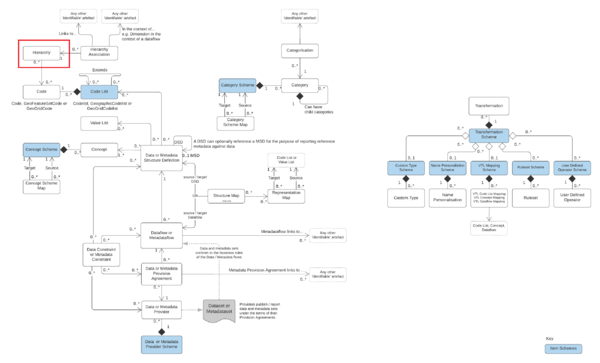Difference between revisions of "Hierarchy"
Jump to navigation
Jump to search
(→Overview) |
(→Structure Properties) |
||
| Line 31: | Line 31: | ||
| <nowiki>urn:sdmx:org.sdmx.infomodel.codelist.Hierarchy</nowiki> | | <nowiki>urn:sdmx:org.sdmx.infomodel.codelist.Hierarchy</nowiki> | ||
|- | |- | ||
| − | + | ||
| − | |||
|} | |} | ||
Revision as of 01:48, 1 September 2022
Contents
Overview
Hierarchys are a separate structure used for describing complex hierarchies of codes, potentially including codes from multiple different codelists. Software tools designed for users to explore and search a catalogue of data sets typically use a Hierarchical Codelists to display a tree structure much like Windows File Explorer.
In SDMX 2.1, Hierarchy Codelists do not explicitly link to any other structures like Dataflows. As such, the result of a user choosing a code is left entirely to the designers of the tools.
The principal features of the Hierarchy Codelists' are:
- A child code can have more than one parent.
- There can be more than one code that has no parent (known as Root codes in the Registry).
- There may be many hierarchies (or “views”) defined, in terms of the associations between the codes. Each hierarchy serves a particular purpose in the reporting, analysis, or dissemination of data.
- The levels in a hierarchy can be explicitly defined or they can be implicit: (i.e., they exist only as parent/child relationships in the coding structure).
Structure Properties
| Structure Type | Standard SDMX Structural Metadata Artefact |
|---|---|
| Maintainable | Yes |
| Identifiable | Yes |
| Item Scheme | Yes |
| SDMX Information Model Versions | 3.0 |
| URN - Codelist namespace | urn:sdmx:org.sdmx.infomodel.codelist.Hierarchy |
